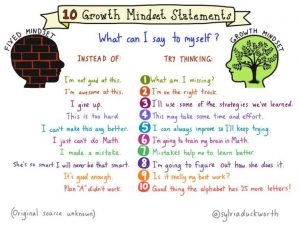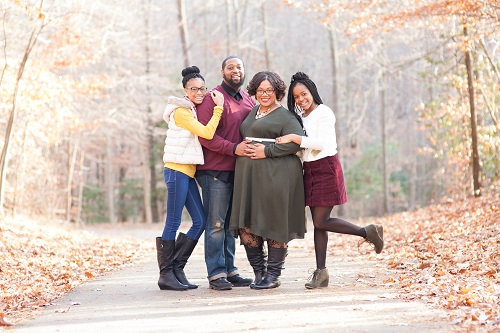Life with kids is an ongoing lesson about just how little control you have. This year, instead of obsessing and making grand plans, I’m choosing to be more reflective about what has worked in the past and how to make it even more successful in the future.
I have three daughters…A newborn and two who are thick in the throes of “tweenager-hood”—one is 12 and the other is 11—with sports schedules, music practices, standardized testing, sibling shenanigans and the ups and downs of friendships. Phew!
In the midst of all of this, our goal has always been to raise daughters who exhibit bravery and humility, have faith in the impossible, believe they can accomplish any task set before them and consistently give 100% in every area of their lives. Easy-peasy, right? Really, it seems a bit unrealistic!
However, as an educator and a mom I think I can really help my girls reach these goals, especially academically, by focusing on my top three R’s—Relationships, Risk-taking and Resiliency.
Develop Positive Relationships
We’ve all asked this question: “What did you do at school today?” Immediately this question is followed by the mundane response, “Nothing.” What seems like a wonderfully open-ended question to us is actually much too vast and too vague for our children. We have to build positive relationships with our children by finding a way into their school life.
Parent.Co offers a great list of 30 questions to ask your kids after school. Here are my favorites:
- What was the funniest thing that happened today?
- What challenged you today?
- What would you rate your day on a scale of 1 to 10? Why?
- Which one of your teachers would survive a zombie apocalypse? Why?
- Tell me something you learned about a friend today.
- When did you feel most proud of yourself today?
- What is one thing you hope to learn before the school year is over?
By starting with these questions after school, the door opens for teaching kids how to cultivate healthy relationships and gives us info to use when building a relationship with the teachers.
Recently our oldest daughter revealed that she was most proud of her score on a Math assessment. Mind you, she scored a 78%. Normally our standard is nothing lower than a B, but she explained how she studied and truly gave her best. Having this conversation allowed me to see how much she valued the time put into studying and opened up the conversation between me and her teacher around which skills she still doesn’t understand and how we might support her both at home and at school.
Our daily conversations not only lead to better relationships with our girls, but also provide talking points when fostering relationships with their teachers.
Encourage Risk-Taking
 Our youngest daughter, who is in her final year of elementary school, was recently invited to play percussion in the middle school band. She was nervous about the opportunity because she doesn’t know many middle school students. Plus, the practices were in an unfamiliar territory—the foreboding and overwhelming middle school building.
Our youngest daughter, who is in her final year of elementary school, was recently invited to play percussion in the middle school band. She was nervous about the opportunity because she doesn’t know many middle school students. Plus, the practices were in an unfamiliar territory—the foreboding and overwhelming middle school building.
Her instinct was to say, “No, absolutely not. Not interested.” Does she love band? Yes! Is she typically up for challenges? Yes! But was this outside of her comfort zone? Yes! Taking risks is hard to do as an adult, let alone as a child.
My husband and I often have asked our daughters to describe their comfort zones: what feels safe and easy for them. Then we elevate that conversation by asking them to list what activities might stretch them to go outside of what is comfortable and into a risk zone—not a danger zone, mind you, but a moderately attainable and possibly fortuitous risk.
Getting uncomfortable is hard and messy; it doesn’t feel good in the pit of the stomach. However, our girls end up getting rewarded ten-fold when their idea of the impossible is shattered and they are able to face their fears.
Build Resiliency
In order for our daughters to give 100% and take risks, they have to know that even when they aren’t successful, it is okay. In our house we call this Bounce Back!
One of our favorite family outings is to the local trampoline gym (by “our” I mean my hubby and daughters do this while I stand on the sidelines and take pictures). They jump higher and higher, trip, fall down, then pop back up—bounce back! It’s the perfect manifestation of what we are trying to teach them: when we fall down, how long does it take to get back up?
 Will it take forever to shake off our failure or do we understand the idea of failing forward? Teaching resilience has a lot to do with the language that we use.
Will it take forever to shake off our failure or do we understand the idea of failing forward? Teaching resilience has a lot to do with the language that we use.
In her book “Mindset: Changing the Way You Think to Fulfill Your Potential,“ Carol Dweck calls this “growth mindset” and speaks highly of the power of the word “yet.” The idea is that our daughters are continuously growing. While they are not perfect at any one area, it is the process of learning and growing (falling down and getting back up) that builds resilience and ultimately supports them in attaining their end goals.
The world is both beautiful and cruel, and our job as parents is to prepare our kids to healthily face and embrace the many challenges that will come their way. By focusing on relationship cultivation, risk taking and resiliency, our kids will soar past their wildest dreams.
Rashida Green is an acting assistant principal in Fairfax County Public Schools, as well as the mom of three daughters.





